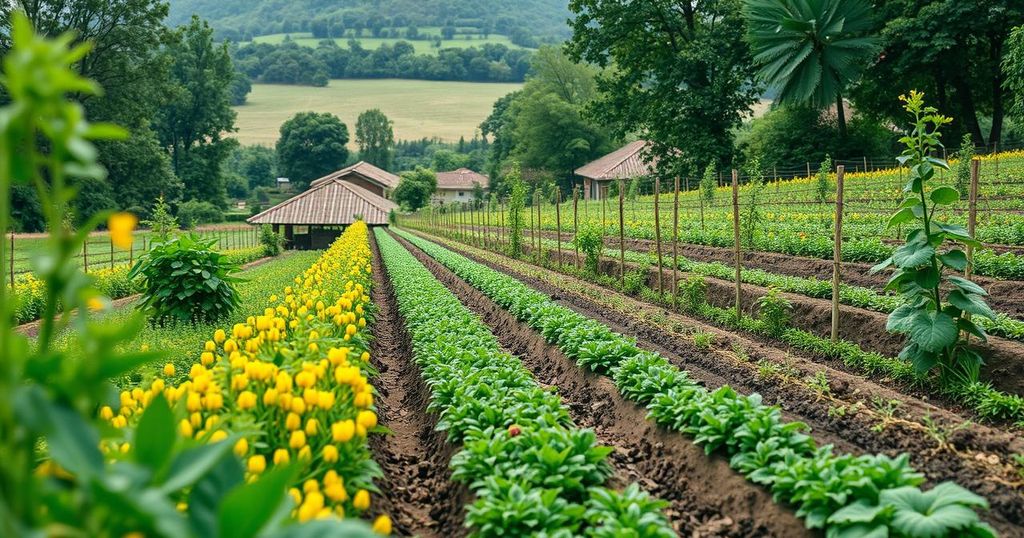Green Transition as a Key Strategy for the Agri-Food Sector
The 2024 World Agri-Food Innovation Conference in Beijing underscored the necessity for an innovation-driven green transition in the agri-food sector to mitigate climate change impacts. Experts cautioned that global temperature increases could lead to significant declines in food production unless technological advancements are integrated into agricultural practices. The conference highlighted China’s pivotal role in enhancing food security and sustainability, advocating for collaborative research and policy innovation at both national and international levels.
During the recent 2024 World Agri-Food Innovation Conference held in Beijing, a distinguished panel of experts emphasized the urgent need for an innovation-driven green transition within the global agri-food system to combat climate change and reduce carbon emissions. Although warmer temperatures have ostensibly benefitted certain agricultural regions, substantial fluctuations and environmental unpredictability have negatively impacted food production globally, particularly across Asia, Africa, and South America. Sun Qixin, president of China Agricultural University and a member of the Chinese Academy of Engineering, stated that current projections predict a 6 to 8 percent decrease in food production for every 1°C rise in global temperatures unless significant technological advancements are made to mitigate such impacts. He underscored the unequal distribution of climate effects, noting that regions traditionally characterized by cold weather are experiencing improved agricultural yields, while others face severe disruptions due to unexpected weather changes. Sun further noted that the green transition entails a considerable reduction in agricultural inputs, such as fertilizers, and thus advocated for increased investment in research and technology to ensure that yields do not diminish as reforms take place. He emphasized the need to advance in this direction despite existing challenges. The Intergovernmental Panel on Climate Change estimates that the agri-food sector accounts for approximately one-third of global greenhouse gas emissions, which encompasses all processes from cultivation to consumption. Fu Wenge, another professor at China Agricultural University, highlighted that impactful innovations do not always necessitate revolutionary scientific breakthroughs; rather, modest, economical changes in management practices can yield significant improvements. He cited the Science and Technology Backyard project, which promotes collaboration between students and smallholding farmers, enhancing agricultural productivity and sustainable practices among rural communities. Ismahane Elouafi, executive managing director of the Consultative Group on International Agricultural Research (CGIAR), asserted that the green transition can encompass a wide array of innovations—including technological, policy-based, and institutional reforms—that encourage international collaboration. She emphasized the pressing nature of climate change, calling for broad adoption of innovative approaches to fundamentally transform agricultural systems. Additionally, Patrick Caron, vice-chair of the CGIAR system board, pointed out that while humanity has historically increased food production, current challenges require a renewed focus on sustainable practices to avert climate change and protect vital resources. The conference also placed a spotlight on China’s proactive role in ensuring food security, with ambitious aims to elevate its annual food production capacity to around 700 million metric tons by 2030. Elouafi noted China’s success in enhancing agricultural productivity while addressing poverty and hunger, highlighting the essential role that technological and innovative strategies have played in this achievement. China’s Foreign Ministry reaffirmed the nation’s commitment to global food security amidst an alarming rise in food insecurity worldwide, emphasizing its leadership in funding, expertise, and projects to combat hunger under the Food and Agriculture Organization’s South-South Cooperation Programme. This initiative coincided with World Food Day, celebrated annually on October 16, which serves to bolster awareness and prompt action towards tackling hunger and enhancing food security globally.
The green transition in the agri-food sector is increasingly recognized as essential for reducing carbon emissions and responding to climate change’s effects on food production. Agricultural practices contribute significantly to global greenhouse gas emissions, prompting experts to advocate for innovative solutions that align agricultural output with environmental sustainability. The discourse surrounding this transition has been highlighted at various international conferences, including the World Agri-Food Innovation Conference, where academics and policymakers gather to discuss actionable strategies for improving food systems while respecting planetary boundaries.
In summary, the call for an innovation-driven green transition within the agri-food sector is a direct response to the dual challenges of climate change and food insecurity. Notable figures in agriculture stress the importance of technological and policy innovations that can simultaneously enhance productivity and reduce environmental impact. China’s ongoing efforts to bolster food security and its leadership in sustainable agricultural practices illustrate a potential pathway for global cooperation in addressing these pressing issues. As this transition becomes increasingly urgent, continued research and collaboration will be vital for achieving a resilient and sustainable agri-food system for the future.
Original Source: en.people.cn




Post Comment